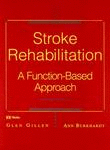|
|
|
| |
 |
|
|

|
 推薦指數:
推薦指數:





|
|
- 內容介紹
|
Stroke Rehabilitation, 2nd Edition - A Function-Based Approach
By Glen Gillen, MPA, OTR/L, BCN and Ann Burkhardt, MA, OTR/L, BCN
Approx. 752 pages, Copyright 2004
ISBN:0323024319
Description
This 2nd edition remains the only comprehensive evidence-based text on the Occupational Therapy management of the stroke patient. The book is based on the most up-to-date research on stroke rehabilitation and presents its content in a holistic fashion, combining aspects of background medical information, samples of functionally based evaluations, and treatment techniques and interventions. There are chapters on specific functional aspects of living after stroke, such as driving, sexuality, mobility and gait, and self-care. Instructor resources are available; please contact your Elsevier sales representative for details.
Key Features
Case studies are featured in every chapter to help the reader understand how concepts apply to the real world.
2 chapters that feature the true stories of stroke victims, presenting occupational therapy situations from the point of view of the patient.
Key terms, chapter objectives, and review questions help students better understand and remember important information.
New to this Edition
7 new chapters make this text more comprehensive than ever!
Psychological Aspects of Stroke Rehabilitation
Improving Participation and Quality of Life Through Occupation
The Task-Oriented Approach to Stroke Rehabilitation
Approaches to Motor Control Dysfunction: An Evidence-Based Review
Vestibular Rehabilitation and Stroke
How Therapists Think: Exploring Clinician's Reasoning When Working With Clients Who Have Cognitive and Perceptual Problems Following Stroke
A Survivor's Perspective II: Stroke
Reflects the current terminology and categorization used by the WHO and the new AOTA Practice Framework so students will be equipped with the latest standards when they enter the workforce.
Updated medication chart presents the latest drugs used in stroke rehabilitation.
Table of Contents
1. Pathophysiology and Medical Management of Stroke 2. Psychological Aspects of Stroke Rehabilitation 3. Improving Participation and Quality of Life Through Occupation 4. The Task-Oriented Approach to Stroke Rehabilitation 5. Activity-Based Intervention in Stroke Rehabilitation 6. Approaches to Motor Control Dysfunction: An Evidence-Based Review 7. Trunk Control: A Prerequisite for Functional Independence 8. Overview of Balance Impairments: Functional Implications 9. Vestibular Rehabilitation and Stroke 10. Upper Extremity Function and Management 11. Edema Control 12. Splinting Applications 13. Casting Applications 14. Functional Mobility 15. Gait Awareness 16. Visual Dysfunction 17. How Therapists Think: Exploring Clinician's Reasoning When Working With 18. Impact of Neurobehavioral Deficits on Activities of Daily Living 19. Treatment of Neurobehavioral Deficits: A Function-Based Approach 20. Enhancing Engagement of Instrumental Activities of Daily Living 21. Driving as an IADL 22. Dysphagia Management 23. Sexual Function and Intimacy 24. Seating and Wheeled Mobility Prescription 25. Home and Community Evaluation and Modifications 26. Assistive Technology 27. Activities of Daily Living Adaptations: Managing the Environment With One-Handed Techniques 28. Leisure Participation After Stroke 29. Complementary and Alternative Medicine in Stroke Recovery 30. A Survivor's Perspective 31. A Survivors Perspective II: Stroke 32. Helping the Family Support the Patient 33. Total Quality Management of the Adult Stroke Population Glossary Clients Who Have Cognitive and Perceptual Problems Following Stroke
|
|
|

